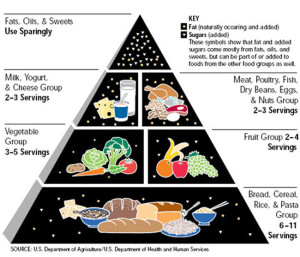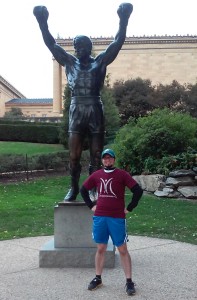Getting Real: Preparation for Egg Retrieval
[CW: Menstruation, medical procedures, and underwear]
I stopped taking testosterone in July.
This isn’t the first time that I’ve gone off T since my transition—in late 2017, I had to stop T two weeks before my top surgery, and I had to stay off for two more weeks afterwards. I was so relieved when I could go back to taking my shots again, mostly because I feared having a period for the first time since 2011.
This time, though, my medication pause will last a lot longer. When I stopped taking T this past summer, it was because my wife and I had decided to pursue another medical marvel: having our first child. Our dream is to eventually have two children—one using one of her eggs, and one using one of mine. After testing and consultation with our fertility doctor, we decided to use one of my eggs first, since I’m older and have a lower ovarian reserve number. This is all very exciting, but it also means that in order to start the egg retrieval process, I have to change the hormonal balance of my body once again.
Stopping T has been a mixed bag. On one level, it’s empowering to see how much of my transition remains in place even when I stop hormones. I still have a beard, my voice is still relatively low, and my body fat is still distributed in a way that tracks with a masculine-of-center gender presentation. It has been freeing to feel like myself even without taking a shot every week, especially since the routine injections are something that have frustrated me for the last seven years. I haven’t felt any significant emotional or mental health effects from stopping, and for that I am grateful. However, just as it did when I was first trying to get my hormone balance right, my face is breaking out like crazy. I feel like one giant pimple, which is frustrating and in one sense feels infantilizing. It’s like going through puberty, again, for something like the fourth or fifth time.
The biggest fear I’ve always had about stopping T, though, is the return of menstruation. I have a vivid memory of writing an anguished blog post back in February 2011, when I had been on testosterone for about one month and was going through what turned out to be my last period. Every drop felt like my body betraying me, fighting me—as if my own flesh was misgendering me with every step. Thankfully, that was the last time I had to go through a menstrual cycle—until today.
Seven years and nine months have passed since I first started testosterone. It’s been 83 days since I stopped. Today, my period started.
It feels very, very different than that last time in 2011. I don’t mean physically—honestly, it’s hard to remember what this experience used to be like, so my basis for comparison is hazy. Emotionally, though, this is very different, because it’s a choice that I made for a specific reason. Kerri and I have been talking about becoming parents for years, and it’s so exciting to make that dream a reality. I knew going into the process that I would have to menstruate in order for the egg retrieval to happen; in fact, for the first month or two I was very worried BECAUSE nothing was happening, and I worried that my system would never restart. Today I feel some relief, because this cycle is strong evidence that I will be able to produce eggs and be a genetic part of our reproductive process.
Of course, menstruating as a man is weird and uncomfortable in a lot of other ways. When I first stopped T, Kerri helped me prepare an emergency kit to leave in my bag, full of tampons and pads and special underwear. I’m so grateful to have a supportive, wonderful partner like her. I thought I was very prepared, but when I first discovered the spotting this morning and knew I’d need to actually use those supplies, I wasn’t ready for it. I usually wear boxers, but for this purpose I bought a pack of boxer-briefs, assuming that I’d easily be able to put a pad in. It didn’t register until this morning that boxer-briefs leave a large amount of space in the crotch, so I had to hike them up in order to get the pad in a useful place. I was at work when I had to put in a tampon, and there were (of course) no disposal bins in the men’s restroom stall, so I had to wrap the applicator in toilet paper and hide it in my palm when I went out to wash my hands. If you thought that was uncomfortable to read, just imagine how uncomfortable it was to do it!
I have often thought to myself that one advantage for cisgender women who have transgender male partners is that we trans men remember what it’s like to have a period, so we are better equipped to understand how our partners feel about it. Today I realized how little I actually do remember what it’s like. Before I noticed the spotting, I was having cramps, but at the time I couldn’t remember what cramps felt like and thought it was indigestion. When I tried to put the pad in, I couldn’t remember whether I was supposed to do it with the underwear on or off, and I wound up sticking it in the wrong place and having to reposition. Even the supplies seem alien to me—I remember using exclusively Tampax Slims, with a soft cardboard applicator and a bare cotton head, but now everything’s plastic and the package is short enough that it fits in the palm of my hand. There’s a lot more variety on the drugstore shelves than I remember.
Today I feel alien to the body I’m in. I don’t know it the way I’m used to. It acts in ways that are unpleasant and out of my control. Yet I went into this process with my eyes open; I know that eventually it will end, and I’ll be able to go back on my hormones and feel like myself again. I also know that the result—our baby—will absolutely be worth it. I feel like I’m experiencing, in a very, very small way, something like pregnancy, and I’m glad to have that small piece of solidarity with my partner. Today also makes our IVF process, quite suddenly, VERY real. We’ve been planning this for months, but now it’s happening, and I can feel it. It’s scary and exciting all at once. With luck, and if all goes well, by this time next year we’ll be parents. Last week I would’ve said “I can’t believe it” – but today, I really, really can.



